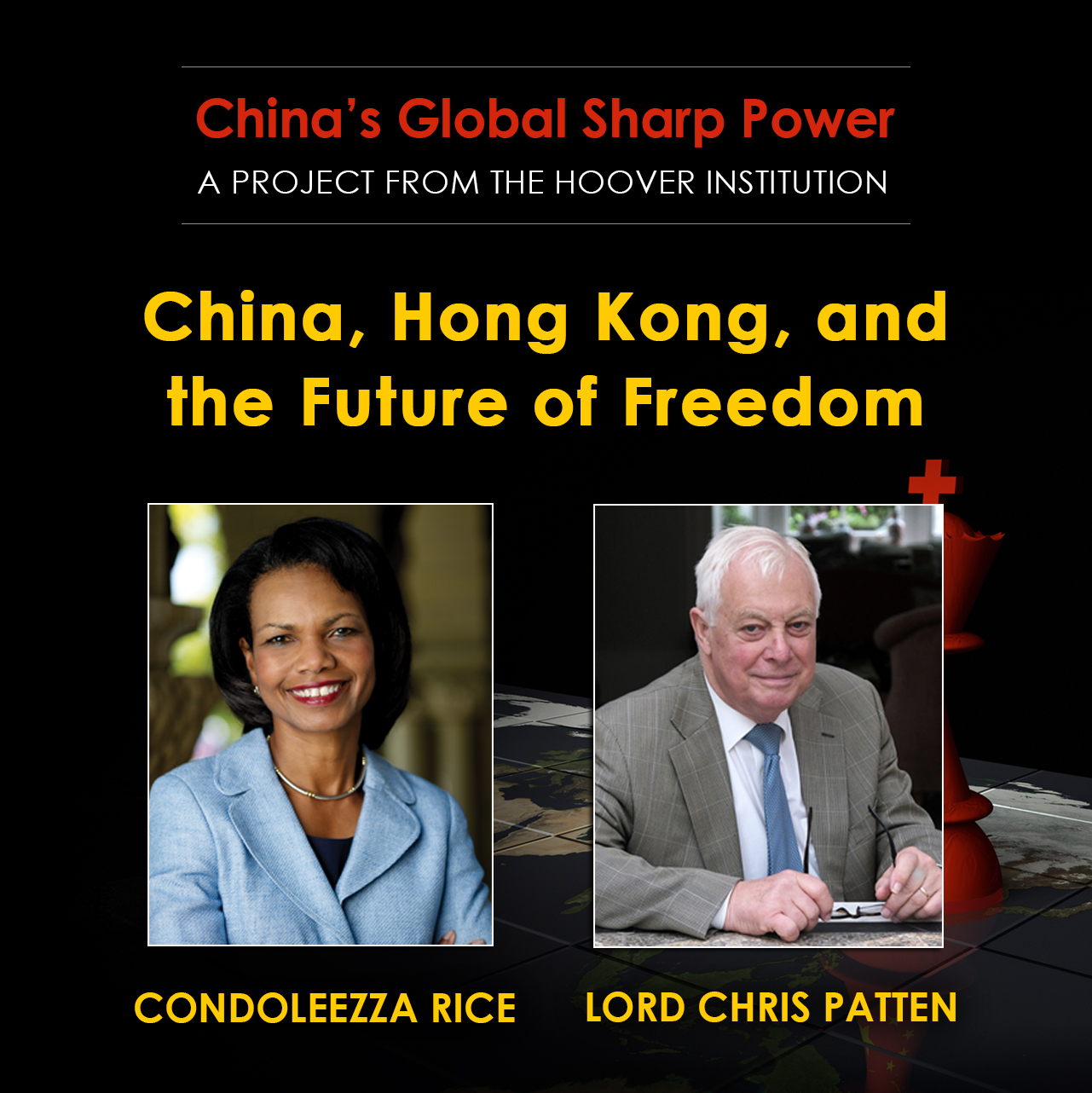Lord Chris Patten, the current chancellor of the University of Oxford and the last governor of British administered Hong Kong, was interviewed by new Hoover Institution Director Condoleezza Rice about the motives behind Beijing’s decision to enact and enforce new national security laws in the special administrative region.
The discussion was the first in a series of programs presented by the Hoover Institution’s Project on China’s Global Sharp Power, a research initiative chaired by Senior Fellow Larry Diamond that aims to track the People’s Republic of China’s efforts to subvert free and open societies and to control global narratives in favor of the ideals and ambitions of the Chinese Communist Party.
Patten was deeply involved in negotiations that returned sovereignty of Hong Kong back to Beijing in 1997. He explained that during the 1970s and 1980s, the United Kingdom was fully committed to this goal as it was greatly embarrassed by its imperial past. He said that though many of Hong Kong’s residents demanded a free and independent democratic state, the UK did not support these aspirations due to resistance from China’s leadership.
The UK and the PRC signed a 1984 Joint Declaration that not only called for the transition of sovereignty by July 1, 1997, but also guaranteed that Hong Kong residents’ economic freedom, personal liberties, and other values in which they were accustomed would remain unchanged for at least 50 years under a constitutional document known as the Basic Law.
This treaty reinforced Hong Kong’s political status under the principle of “One Country, Two systems.”
“Hong Kong was on the way to democracy,” Patten said. “My job when I got to Hong Kong [in 1992], was to stand up for what had already been agreed [to in the 1984 Joint Declaration].”
Patten was initially encouraged that Beijing would live to up their end of the bargain. For a little more than a decade after the departure of the British, the Communist Party had largely left Hong Kong alone.
Patten attributes this change in position to the rise to globalization and the technological revolution. In addition, Beijing was also alarmed by an attempted coup in 2011 inspired by Bo Xi Lai, the reform-minded Communist Party secretary of Chongqing.
These events led a Chinese Communist Party committee, chaired by then Vice President Xi Jinping, to draft a communiqué aimed to prevent the infiltration and dissemination of ideas hostile to Chinese ideology, including constitutional democracy, economic liberalization, and human rights.
“Hong Kong represents all those values that they deplore,” Patten maintained.
Patten said that the Communist Party sees a free and open society in Hong Kong as an existential threat to the surveillance state they have imposed over the rest of the mainland. As China’s income levels rise and the middle class expands, its citizens may demand political reforms and similar personal freedoms enjoyed by the residents of Hong Kong.
Patten added that despite the struggle over Hong Kong’s sovereignty, the special administrative region remains enormously important for Beijing’s commercial interests. Seventy percent of all Chinese companies’ IPOs are initiated through Hong Kong, and it remains a major hub for firms specializing in hedge funds. Though Hong Kong currently represents 3 percent of China’s total economy (its share was 25 percent in 1997), its continued economic freedom leads Patten to suspect that Beijing will not want to shake up the region’s financial institutions in the near term.
Patten believes that Beijing has reached what he calls “peak muscularity” and has underlying troubles including mounting debts, an aging population, and record droughts. He argues that China’s aggressive posture against Hong Kong, on the Sino-Indian border, and in the Taiwan Strait and the South China Sea is evidence that the PRC leadership has overplayed its hand.
He explained that the most effective way to combat Beijing’s hostility is to build confidence in American-led alliances and security partnerships, reduce economic dependence on China, and resist attempts by the Communist Party to rewrite international norms and assume global leadership.
Patten maintained that the US and its allies should remain vigilant to the threat of intellectual property theft posed by China on their tech companies and research institutions; insist that Taiwan be given observer status in the World Health Conference, especially in light of its effective crisis response to the COVID-19 pandemic; and demand that China more fairly reciprocate on trade and grant wider access to its markets.
“If only we have the gumption to stand up for ourselves and what we believe in as representatives of free and open societies, [we are] bound in the long run to be more sustainable than technological totalitarianism,” Patten concluded.
WATCH THE DISCUSSION























